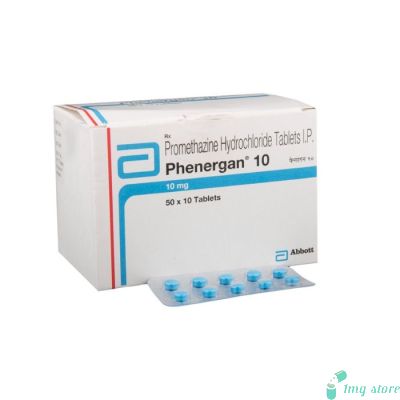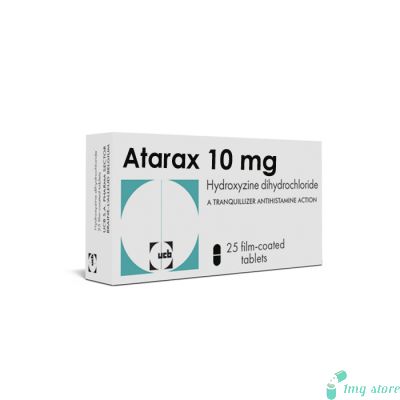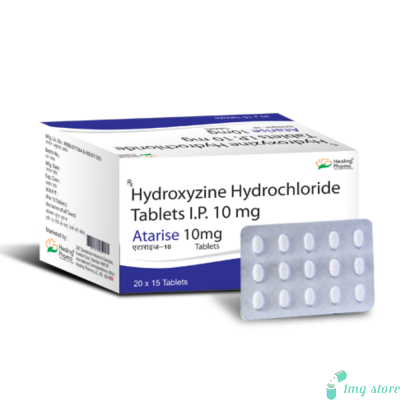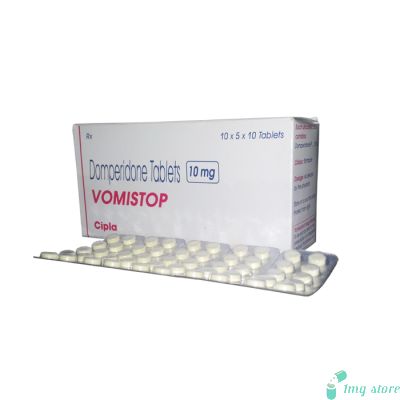Phenergan Injection (Promethazine)
Buy Promethazine injection, commonly known by its brand name Phenergan, is a medication belonging to the class of phenothiazines. It is primarily used to treat various medical conditions, including allergies, nausea and vomiting, motion sickness, and as a preoperative sedative.
Promethazine Injection 25mg/ml (Phenergan)
Promethazine injection, commonly known by its brand name Phenergan, is a medication belonging to the class of phenothiazines. It is primarily used to treat various medical conditions, including allergies, Nausea and vomiting, motion sickness, and as a preoperative sedative. Promethazine works by blocking certain receptors in the brain that are responsible for triggering nausea and vomiting, thereby providing relief from these symptoms. The drug is available in multiple formulations, with the injection form being useful in cases where oral administration is not feasible or effective.
Dosage Information
The dosage of Promethazine injection 2ml (Phenergan) can vary based on the specific medical condition being treated, the patient's age, weight, and response to the medication. It is crucial to follow the prescribed dosage and administration instructions provided by the healthcare professional. The injection is typically administered intramuscularly (IM) or intravenously (IV) by a healthcare provider in a clinical setting.
The standard dosage recommendations are as follows:
- Allergic Conditions and Nausea/Vomiting: The usual adult dose for allergic conditions and nausea/vomiting is 25 mg to 50 mg injected IM or IV. The injection can be repeated every 4 to 6 hours as needed.
- Motion Sickness: For motion sickness, the recommended adult dose is 25 mg injected IM or IV before travel. If needed, a repeat dose can be given in 8 to 12 hours.
- Preoperative Sedation: Before surgery, an adult may receive a dose of 25 mg to 50 mg injected IM or IV.
Dosage adjustments may be necessary for pediatric patients, elderly individuals, and those with certain medical conditions, as determined by the healthcare provider.
Promethazine Injectable: Promethazine injectable is a medication administered via injection, commonly used to treat various allergic conditions, including hives, itching, and allergic reactions. It works as an antihistamine, providing relief from symptoms such as itching, runny nose, and sneezing.
Promethazine Syringe: A Promethazine syringe contains the injectable form of the medication, Promethazine. The syringe presentation allows for accurate dosage and easy administration of the medication for treating allergic reactions, nausea, and motion sickness.
Promethazine 25mg Injection: Promethazine 25mg injection is a specific dosage form of the medication designed to provide the patient with 25 milligrams of Promethazine. It is commonly used to manage allergic conditions and symptoms associated with various allergic reactions.
Promethazine Injectable Price: At 1mgstore.com, you can find competitive prices for Promethazine injectables. Our website offers a convenient platform for purchasing medications, including Promethazine injectables, ensuring affordability and accessibility for our customers. Check out our website to buy Promethazine Injection and experience a seamless online shopping experience for your healthcare requirements.
Before using Phenergan Injection (Promethazine), it is essential to consider certain precautions
- Allergies: Buy Promethazine but Inform the healthcare provider about any known allergies to Promethazine or other phenothiazines, as well as any other allergies, to avoid potential adverse reactions.
- Medical History: Provide a comprehensive medical history, including any past or current medical conditions such as respiratory problems, liver disease, kidney disease, heart conditions, and blood pressure issues.
- Pregnancy and Breastfeeding: If pregnant or planning to become pregnant, or if breastfeeding, consult the healthcare provider before using Promethazine to weigh the benefits and risks.
- Pediatric Use: Promethazine should be used with caution in young children and infants due to the risk of severe respiratory depression. Avoid use in children under two years of age.
- Elderly: Elderly individuals may be more sensitive to the sedative effects of Promethazine, requiring lower doses.
- Driving and Operating Machinery: Due to its sedative properties, avoid activities that require mental alertness, such as driving or operating heavy machinery, while under the influence of Promethazine.
- Alcohol and CNS Depressants: Avoid alcohol and other central nervous system (CNS) depressants while taking Promethazine, as they can enhance sedation and respiratory depression.
- Anticholinergic Effects: Promethazine can cause anticholinergic side effects like dry mouth and blurred vision, especially in elderly individuals.
It is essential to discuss all medications, supplements, and herbal products being taken with the healthcare provider to prevent potential drug interactions.
Promethazine injection (Phenergan) finds application in various medical situations, including:
- Allergic Reactions: It is used to manage allergic reactions such as itching, hives, and rashes.
- Nausea and Vomiting: Promethazine helps alleviate nausea and vomiting, commonly associated with Motion Sickness, certain medications, and medical conditions.
- Sedation: The drug is used for preoperative sedation to calm and relax patients before surgery.
- Adjunct in Anesthesia: Promethazine may be used as an adjunct in anesthesia to reduce anxiety and enhance the effects of other anesthetic agents.
- Treatment of Migraines: In some cases, Promethazine is employed as an adjunctive therapy for managing migraines.
- Sedation in Pediatrics: It can be used for sedation in pediatric patients undergoing certain medical procedures.
- Management of Nausea and Vomiting in Pregnancy: In some instances, Promethazine is prescribed to pregnant women to manage nausea and vomiting.
- Treatment of Vertigo: Promethazine can help relieve symptoms of vertigo and dizziness.
Crucial Side Effects to Be Observed When Using Phenergan Injection (Promethazine)
While Promethazine injection is generally safe and effective when used as directed, it may cause certain side effects in some individuals. Not everyone experiences these side effects, and they can range from mild to severe. Common side effects include:
- Drowsiness or sedation
- Dizziness
- Blurred vision
- Dry mouth
- Constipation
- Nausea
- Headache
These mild side effects usually subside on their own, but if they persist or worsen, it is essential to inform the healthcare provider. In some cases, more severe side effects may occur, such as:
- Severe dizziness or fainting
- Difficulty breathing or swallowing
- Uncontrolled movements or muscle spasms
- Severe drowsiness or confusion
- Yellowing of the skin or eyes (jaundice)
- Unusual bleeding or bruising
If any of these severe side effects are experienced, immediate medical attention should be sought.
Answers to Common Inquiries About Promethazine Injection (Phenergan)
FAQ 1: Can Promethazine Injection (Phenergan) be used for motion sickness in children?
Answer: Yes, Promethazine injection can be used for motion sickness in children, but with caution. It is generally not recommended for children under two years of age due to the risk of severe respiratory depression. In older children, the dosage should be adjusted based on their age, weight, and medical condition. Always consult a healthcare professional before administering any medication to children.
FAQ 2: Can I take Promethazine Injection (Phenergan) with other allergy medications?
Answer: Combining Promethazine with other antihistamines or allergy medications may lead to increased sedation and side effects. It is best to avoid using multiple allergy medications simultaneously unless directed by a healthcare provider. Always consult a doctor before combining any medications to ensure safety and effectiveness.
FAQ 3: Does Promethazine Injection cause addiction or dependence?
Answer: Promethazine itself is not considered addictive; however, like other CNS depressants, it may lead to physical or psychological dependence if misused or abused. To prevent any potential dependency issues, it is crucial to take the medication as prescribed and not exceed the recommended dosage or duration of treatment.
FAQ 4: Can I use Promethazine Injection (Phenergan) during pregnancy?
Answer: The use of Promethazine during pregnancy should be carefully evaluated by a healthcare professional. While it is generally considered safe for short-term use to manage certain conditions, the potential risks and benefits must be weighed. Pregnant women should always consult their obstetrician or healthcare provider before taking any medication during pregnancy.
FAQ 5: Can Promethazine Injection (Phenergan) be given to patients with a history of liver disease?
Answer: Patients with a history of liver disease should use Promethazine with caution. The drug is metabolized in the liver, and impaired liver function may affect its clearance from the body, leading to potential side effects. Dosage adjustments may be necessary in such cases. It is essential to inform the healthcare provider about any liver conditions before starting Promethazine therapy.
Significant Drug Interactions that Require Attention For Promethazine Injection (Phenergan)
Promethazine injection (Phenergan) may interact with other medications, altering their effects or increasing the risk of side effects. Some notable drug interactions include:
- Central Nervous System (CNS) Depressants: Concurrent use of other CNS depressants, such as alcohol, opioids, sedatives, or tranquilizers, may potentiate the sedative effects of Promethazine, leading to excessive drowsiness or respiratory depression.
- Anticholinergic Drugs: Combining Promethazine with other medications having anticholinergic properties can increase the risk of anticholinergic side effects like dry mouth, constipation, and blurred vision.
- Epinephrine: Promethazine may decrease the effectiveness of epinephrine in treating severe allergic reactions.
- MAO Inhibitors: Concurrent use of Promethazine with monoamine oxidase (MAO) inhibitors can result in serious, potentially fatal interactions.
- Antiemetics: Combining Promethazine with other antiemetic medications may lead to additive effects.
- Antihistamines: The concurrent use of other antihistamines with Promethazine can increase the risk of side effects.
- Diuretics: Promethazine may interfere with the actions of certain diuretics, leading to potential adverse effects.
It is vital to inform the healthcare provider about all medications being taken, including prescription drugs, over-the-counter medications, vitamins, and herbal supplements, to avoid potential interactions.
| Manufacturer | : | Abbott, India |
| Equivalent Brand | : | Phenergan |
| Generic Search | : | Promethazine |














